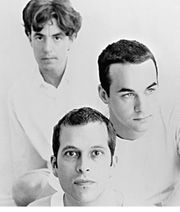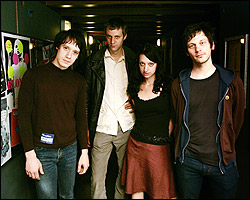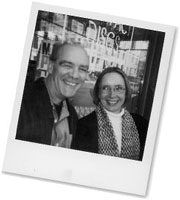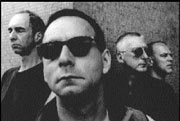“I THINK THIS SUBCULTURE—and you know the whole indie rock thing is a serious subculture—I think the whole subculture is sort of thankfully turning a corner. People can again acknowledge that they like what they do. For a while there, it was like bands didn’t like music. There was this constant denial of what the hell they were actually doing. This constant evasion that, hey, you’re playing music, you’re entertaining, you’re singing songs.” On the other end of the phone line, on the other side of the country, drummer and songwriting collaborator Brendan Harney of Wheat speaks in hurried sentences, his Rhode Island accent softly lilting over vowels and sharpening consonants.
Wheat
Sit & Spin, Tuesday, September 12
He’s got a point.
Listen up doleful, insolent indie rockers: You’re playing music. You’re entertaining. You’re singing songs.
Around about the time you settle into the fact that guitar rockers and James Brown are in the same bag, you can start to appreciate the fact that the rock music business really is show business, and show business is all about hard work. Especially when you’re Harney, guitarist Ricky Brennan, or singer Scott Levesque. Especially when you’re New England’s finest indie rock band, Wheat. Not content with the oversimplified, DIY aesthetic that catches and snags the sweaters of lots of indie rockers, Wheat has shown with 1999’s Hope and Adams (on Chicago’s Sugar Free Records) that they work hard at sounding good. With a dedication to teamwork and cooperative songwriting, an appetite for hours of jamming and improving, and a promise to rise above the mess of blindly accepted bland, boring bands, Wheat aims to be the hardest working band in indie rock. And with help from Dave Fridmann, the studio mastermind behind Flaming Lips, Mercury Rev, and a ton of other independent and major label favorites, Wheat’s latest sounds like a reverent and careful step forward by a band that’s lucky enough to know the way by heart and smart enough to make sure they’ve got the right directions.
If you shuffle through albums by the Sea and Cake, Simon and Garfunkel, Pavement, and Sparklehorse and find the common denominator in all of them, what you end up with sounds a lot like the songs on Hope and Adams. Lines like “You’re asking me to climb down from my tree house and dance upon the smallest limb” and “Your love is a parking lot” draw on slightly math-y, melodious music to back up their twisted yet romantic philosophy. For every straightforward, riffed guitar line, there are fragments of chords that belie beauty, twinkling, magically ironic hums, evocative echoes, strings of smashed keyboard notes, and manic, moody drumbeats.
I’VE LONG BEEN SORRY that rock music is so often mucked up by a need to be cool. Like drawing long, steady breaths on a bong and then denying that you’re high, shying away from the brilliance of creating rock is pointless. Way before I started writing about music, I was talking about music, reading about music, living and breathing music. And back before anyone ever had to worry that what they said to me would end up in the paper, it was hard to get anyone to admit that they picked up their guitar and started strumming chords because they thought that maybe someday people would pay 10 bucks each for the pleasure of moving back and forth to the din of their tunes in a crowded room.
“I get weird with the whole indie rock thing,” Harney says. “I don’t appreciate bad musicianship. We really do actually work hard at playing. It’s a craft.”
So happy to finally be on the receiving end of these refreshing confessions, I sit back and listen for more: “You don’t throw on a couple of cool shirts and a cool shoe. . . . That’s the thing; the result can seem so simple. Some of our songs are sad, or whatever, and some people think writing a simple, sad song is really easy. But it’s really hard. It takes a lot of work. You don’t make a good record by luck. It’s this huge fallacy that some people have cool songs oozing out of them. It really doesn’t work that way.”
Hope and Adams is proof that their diligence has paid off. While the band’s first effort, Medeiros, required learning songs written primarily by Levesque, their second album is a testament to their collective creative efforts. It takes more risks. It’s crisp and layered but not heavy-handed or overdone. The album experiments with accidents. The ideas were worked and reworked until they became clear enough to be understood and vague enough that they are still open to interpretation. A lot of effort went into creating sounds that can mean one thing on Tuesday and something completely different on Friday.
“It’s really about that open-endedness,” concludes Harney. “That’s the way I think the songs resonate the most with people. When you can feel a part of them.”
Get an indie rocker to admit that she or he’s an artist? Pretty difficult to do. Get one to admit that they’re entertaining the masses, provoking thought, and honing a craft? Maybe. Just maybe.
Visit Sugar Free’s site at www.sugarfreerecords.com to access mp3s, purchase CDs, and more.








